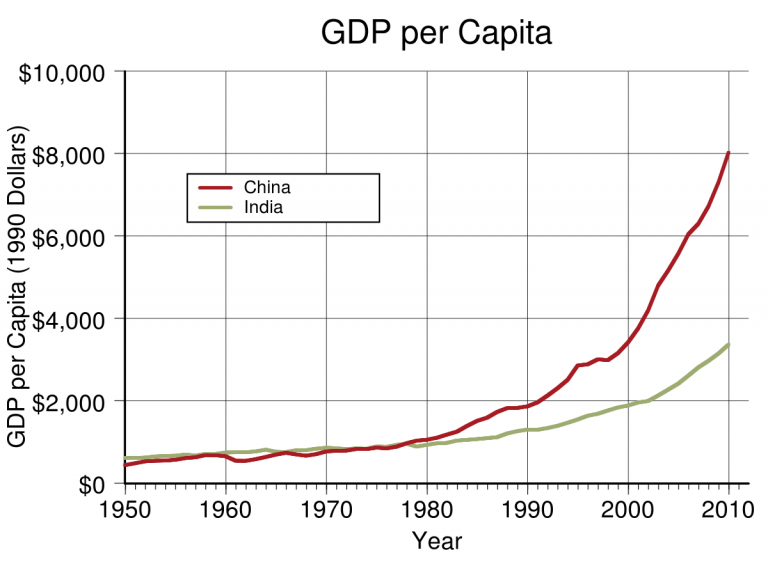The India-China Border Issue Tyler Durden Sat, 07/25/2020 - 20:50
Authored by Jayant Bhandari via Acting-Man.com,
Deep-Seated Racism and Happy-Smiley Hypocrites
In Delhi, people of the northeastern part of India, who have mongoloid features, are derogatorily called “chinky.”
It is not unusual for men in Delhi to stop their cars to proposition a random girl from the northeast for a sexual encounter, assuming her to be “loose.”
Indians’ ignorance about the geography of their own country, their irrationality, superstitions and bigotry have been fertile ground in these days of Covid-19. People from the northeast have faced massive problems based on the assumption that they are carriers of the virus. They have been refused services at shops and have been thrown out by landlords.
Indians from the northeast being denied entry into a shop
The girl from the northeast was spat at and called “corona,” instead of “chinky.”
Girls from the northeast threatened with eviction for “being carriers of corona-virus” being saved by the police
To visit monuments in India, an Indian pays a much lower charge than a non-Indian. Most Indians buy their entrance tickets, but not those from the northeast. They must prove that they are Indian by showing their IDs. Even then, the ignorant-ticket seller might still insist on the price foreigners pay.
Indians like to believe that they have a great family system and that they are generous and welcoming. Quite in contrast, surveys show Indians to be among the most race, color, caste, and religion conscious people in the world. My friend in Delhi had one of the happiest families I have seen. When I probed, she told me that hers was a “happy-smiley” family.
I didn’t know what that meant. She told me it was about a family in which everyone hated each other, but which made a great public display of their cohesion. While I had forgotten about this hypocrisy, I recalled how completely blown away I was when I met real, functional families in the UK during my first visit abroad.
India, one of the most racist countries
Complicated Relations
Since 1962 China has been regarded with derision in India. Contrary to the indoctrination Indians get, it was an extremely embarrassing defeat for India, which offered no resistance in most places. In those days, India’s GDP was higher than that of China.
Today, China is five times richer than India and invests a higher proportion of its budget in its armed forces. By that measure, any renewed armed conflict between India and China will likely give China an even more comfortable win over India.
India had a larger GDP than China in 1962; Now China’s is five times larger
Most Indians, who are vicariously proud while sitting in front of their TV, think that it is China that is afraid of India. It is so easy to feel courageous when the person who dies is not you or your son.
India has complicated relations with all its neighbors, perhaps with the slight exception of Bhutan, which is stuck in such a way that it cannot complain, even if it wanted to. Still, muffled noises do even come out of Bhutan once in a while.
India’s relationship with its closest ally Nepal, the only other Hindu country in the world, has taken a tumble
India is one of the most closed countries in the world. Countries around the world today have an open road system and a visa-free regime with their neighbors, irrespective of any border issues they may have.
India has virtually no road connection with its neighbors, a product of an extremely paranoid and close-minded Indian ruling class. They are scared that someone might do better, and cross-border friendships and business relations might develop. These bureaucrats are not just corrupt but brimming with jealousy and sadism.
Indians think that getting a visa is an achievement, forgetting that an Indian passport has no value. It gives Indians visa-free travel only to Nepal, Bhutan, and a handful of small countries, making it one of the worst passports in the world.
So disconnected are Indians from the on-the-ground realities of China that they think all of China is a bubble and a backwater communist tyranny. The fact that Indians are among the most bigoted people, and their ruling class neurotic, paranoid, and close-minded must be taken into account when evaluating India’s border problems with China.
In 1962 China voluntarily ceded many areas it had taken over from India, despite officially maintaining claims over them. Contrary to popular perception, China is not necessarily an expansionary power. It took over Hong Kong and Macau after protracted negotiations, rather than through coercive measures.
And Tibet, which has historically been an area of Chinese influence, is not necessarily as clear-cut an issue as Richard Gere has made it out to be.
At Odds with Reality
In his speech about the recent Chinese incursion into India, Indian Prime Minister Narendra Modi said there had been no such incursion. Very quickly India’s media and society proceeded to ignore the horrendous and glaring contradiction between Modi’s words and the scores of dead Indian soldiers.
The dead get word from the prime minister… [PT]
Modi didn’t care to explain what the border problem was all about then. Also, he gives no — none, zip, nada — appearances before journalists in public. If he ever does an interview, everything is scripted to minute details.
The most important job of the Indian government is to protect its borders, but for all intents and purposes, Modi does not think that Indians need to know what is happening. It is clear that despite all the chest-thumping, India cannot afford a war with China.
China is scared of all religions. Its most significant worry is Xingjian, a Muslim province. There is a highway that runs from Tibet to Xingjian. This highway is in a desert, Aksai Chin, which is claimed by India and close to the area of the current conflict. New infrastructure building by India in that area has also put at risk the Karakoram highway, which connects Xingjian to Pakistan and then to the sea.
Indeed, most of the contested territories are deserts or glaciers, of no value to anyone by themselves — although, Indians and Pakistanis are obsessed with land, even deserts, which cost them a considerable amount of blood and treasure to defend.
Expensive contested desert [PT]
Misapprehending China
Is the current Chinese incursion nothing but China’s attempt to protect its highways? Did India fail to offer security guarantees? Given the self-centered, paranoid nature of India’s ruling class, I wouldn’t be surprised. China certainly hasn’t moved in for any internal, nationalistic reason.
There is minimal coverage of the border problem inside of China. In contrast, Indians have gone into a trance regurgitating how Indian troops killed twice as many Chinese — as if that was a yardstick — without providing any evidence. Indians generally don’t understand China, and it is doubtful whether many Indian bureaucrats understand China or speak Mandarin.
According to international law, China was likely at fault by dint of its incursion, and Xi Jinping is considered heavy-handed both internationally and domestically. Still, India has no choice but to live next to China, in an evolving world in which the US is less and less interested in the affairs of other countries.
Moreover, India doesn’t have comparable economic power, which is why other countries may show sympathy, but will do nothing more. When it comes to the crunch, it is China that matters to the West, not India. This realpolitik-informed situation is incomprehensible to heavily propagandized Indians.
There is a much deeper question. India, rather than Pakistan, should have been a close ally of China. At least India is constitutionally secular, whereas Pakistan is sharia-compliant. China needed a road system to get to the Indian ocean. India did not grant it the right of way; had India done so, it would have given China a reason to be friendly toward India.
Moreover, the Chinese economy both on a gross and a per capita basis is five times that of India. India is to China what Mexico is to the US. This is a reality Indians adamantly ignore, for they have come to see themselves at the cutting edge of growth and technology – all vicariously, for half of India’s citizens still poop in the open.
https://ift.tt/30Kljek
from ZeroHedge News https://ift.tt/30Kljek
via IFTTT









0 comments
Post a Comment